
In 2025, businesses rely on cost-efficient AI platforms to manage workflows and control expenses. The top platforms - prompts.ai, IBM watsonx Orchestrate, UiPath, Metaflow, and Ray Serve - offer unique solutions for routing prompts, integrating workflows, and ensuring compliance. Here's what you need to know:
Quick Comparison:
| Platform | Key Features | Best For | Pricing Highlights |
|---|---|---|---|
| prompts.ai | Unified access to 35+ models | SMBs and startups | $0–$129/month, TOKN credits |
| IBM watsonx Orchestrate | Enterprise integrations, compliance | Large enterprises | Custom enterprise pricing |
| UiPath | AI + RPA for workflows | Automation-focused businesses | Scales with usage |
| Metaflow | Open-source ML tools | Data science teams | $0–$100/month |
| Ray Serve | Scalable model serving | Tech-savvy organizations | Infrastructure costs only |
For most businesses, prompts.ai offers the best balance of cost savings, ease of use, and flexibility. Its TOKN credit system and centralized tools simplify AI workflows while keeping budgets in check.
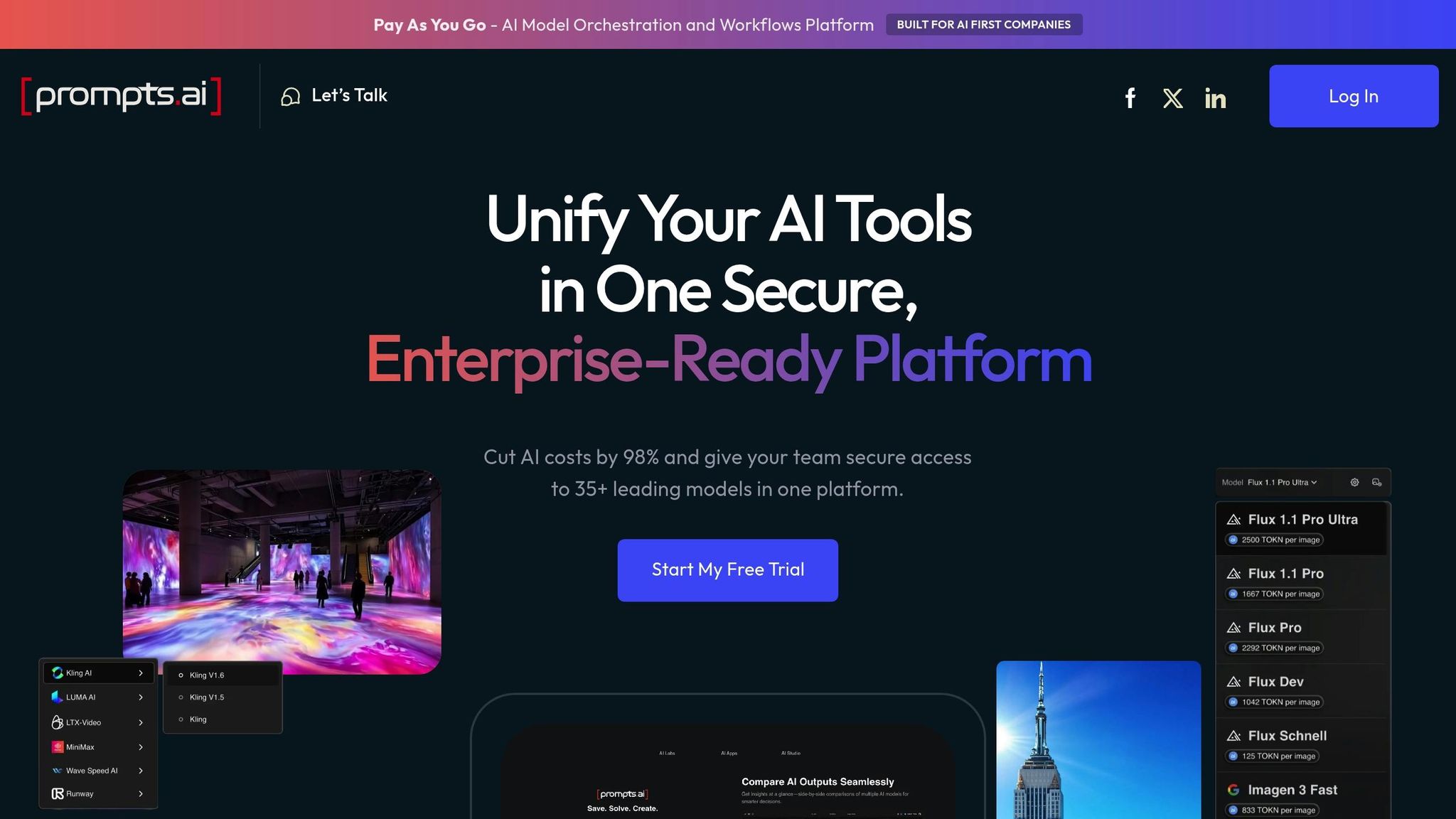
Prompts.ai brings together more than 35 AI models on a single platform, simplifying access to tools like GPT-5, Claude, LLaMA, and Gemini. By consolidating these models into one interface, it eliminates the need for multiple subscriptions and helps businesses in the US reduce operational costs.
With Prompts.ai, AI-related expenses can be reduced by as much as 98%, thanks to its ability to replace over 35 separate tools. It also slashes setup time by 95%, getting users up and running in just 10 minutes. The platform’s TOKN credits system ensures transparent usage tracking, replacing fixed subscription fees with scalable, pay-as-you-go pricing. This flexibility allows teams to compare language models side-by-side and achieve up to 10x productivity gains.
These savings extend to workflow automation, making operations even more efficient.
Prompts.ai supports workflow automation across various departments, enabling users to design custom automation sequences that connect multiple AI models. This feature has proven its value in real-world applications. For instance, Dan Frydman noted how the platform’s rapid visual outputs speed up approval processes. Similarly, Art. June Chow, an architect, appreciated how the ability to compare different language models side-by-side has helped bring complex projects to life and explore new concepts. With unlimited workspaces and collaboration options in business plans, teams can scale their AI efforts without restrictions.
Prompts.ai offers enterprise-grade governance, ensuring full visibility and auditability while meeting US compliance standards. Centralized control over model access and usage creates clear audit trails, helping businesses avoid unnecessary expenses and align AI operations with corporate policies and regulations. This secure framework safeguards sensitive data and promotes responsible AI use.
The platform provides a straightforward, USD-based pricing model with standard US billing cycles and flexible plans tailored to different needs.
| Plan Type | Monthly Price | TOKN Credits | Key Features |
|---|---|---|---|
| Pay-as-you-go | $0 | Limited | 1 workspace, 1 GB storage |
| Creator | $29 | 250,000 | 1 collaborator, 5 GB storage |
| Family Plan | $99 | 500,000 | Enhanced storage and features |
| Plan Type | Monthly Price | TOKN Credits | Key Features |
|---|---|---|---|
| Core | $99 | 250,000 | Unlimited workspaces & collaborators |
| Pro | $119 | 500,000 | Advanced integration and workflow support |
| Elite | $129 | 1,000,000 | Maximum credits and full-feature set |
This transparent pricing structure allows US businesses to budget effectively and scale their AI operations based on actual usage.
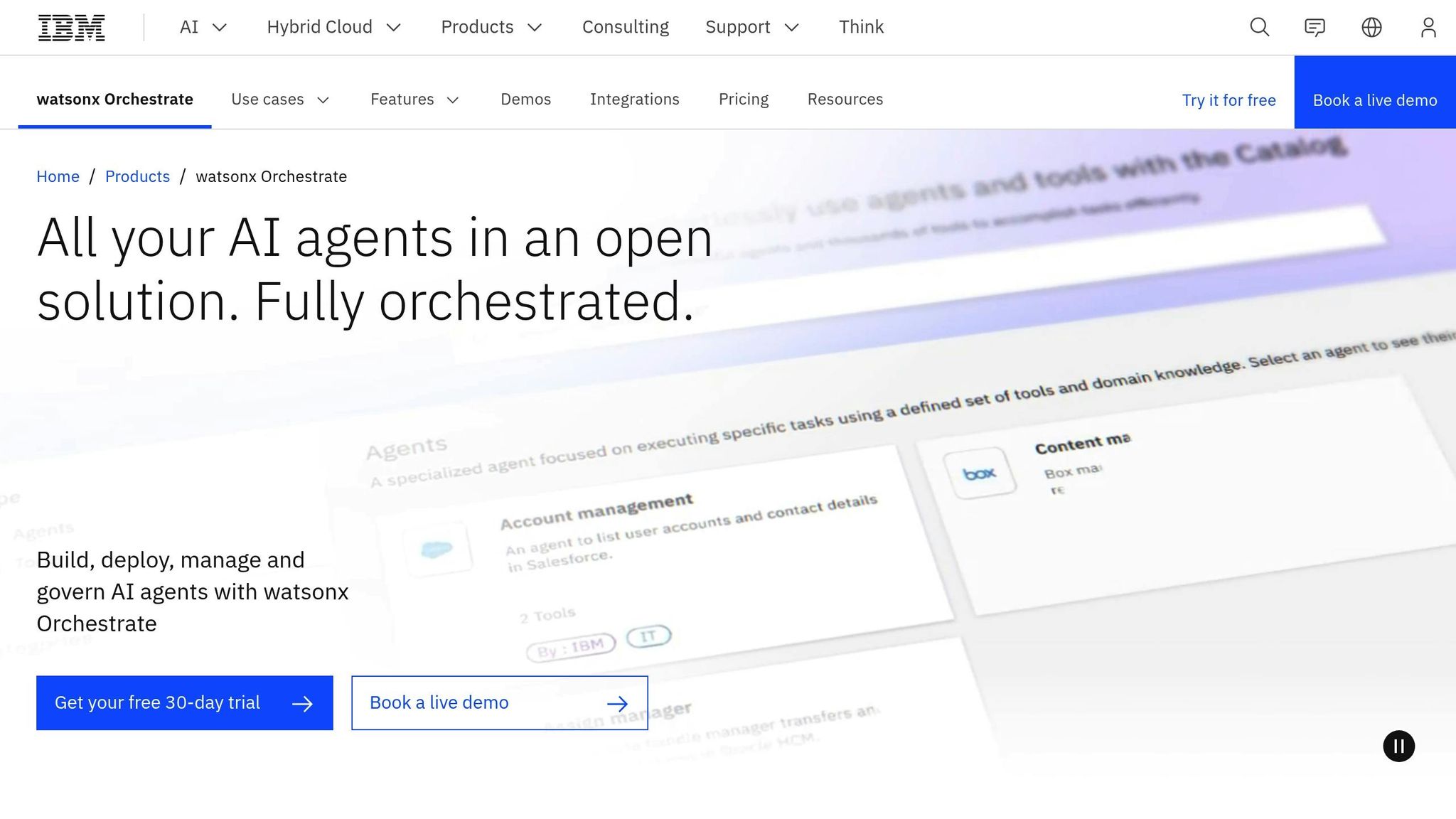
IBM watsonx Orchestrate is an AI-driven platform tailored for enterprises, designed to simplify AI workflows while controlling costs. With features aimed at efficiency and scalability, it offers businesses a smart way to manage their AI operations.
The platform uses a consumption-based pricing model, ensuring you only pay for the resources you actually use. By intelligently routing simpler tasks to less expensive models and reserving high-performance models for complex needs, it helps optimize spending. Additionally, pooling resources across departments eliminates redundant subscriptions, creating cost savings through shared economies of scale.
IBM watsonx Orchestrate seamlessly connects with widely used enterprise systems, cutting down the time and effort needed for custom API development. Its intuitive no-code workflow builder allows users to create automation solutions with a simple drag-and-drop interface, reducing reliance on IT teams and speeding up deployment. Batch processing capabilities further enhance efficiency by scheduling large-scale tasks during off-peak hours, helping organizations make the most of their AI budgets.
The platform adheres to strict security standards, including SOC 2 Type II, GDPR, HIPAA, and SOX compliance, making it suitable for industries with rigorous regulatory requirements like healthcare and finance. Detailed audit logs are maintained for transparency, while a centralized governance dashboard provides administrators with insights into AI usage, costs, model performance, and compliance metrics. For US-based organizations, data residency controls ensure that sensitive information stays within the country, addressing data sovereignty concerns.
IBM watsonx Orchestrate uses USD-based pricing with flexible billing options, offering monthly or annual terms to suit different business needs. The pricing structure typically includes platform access, credits for AI model usage, and optional premium support services. Enterprise clients can negotiate custom agreements that may feature volume discounts, dedicated support, and tailored service level terms. For those hesitant to commit long-term, pilot programs are available, allowing businesses to evaluate the platform's cost-effectiveness before making a decision. This pricing setup aligns with the platform's goal of delivering efficient and economical AI workflow management.
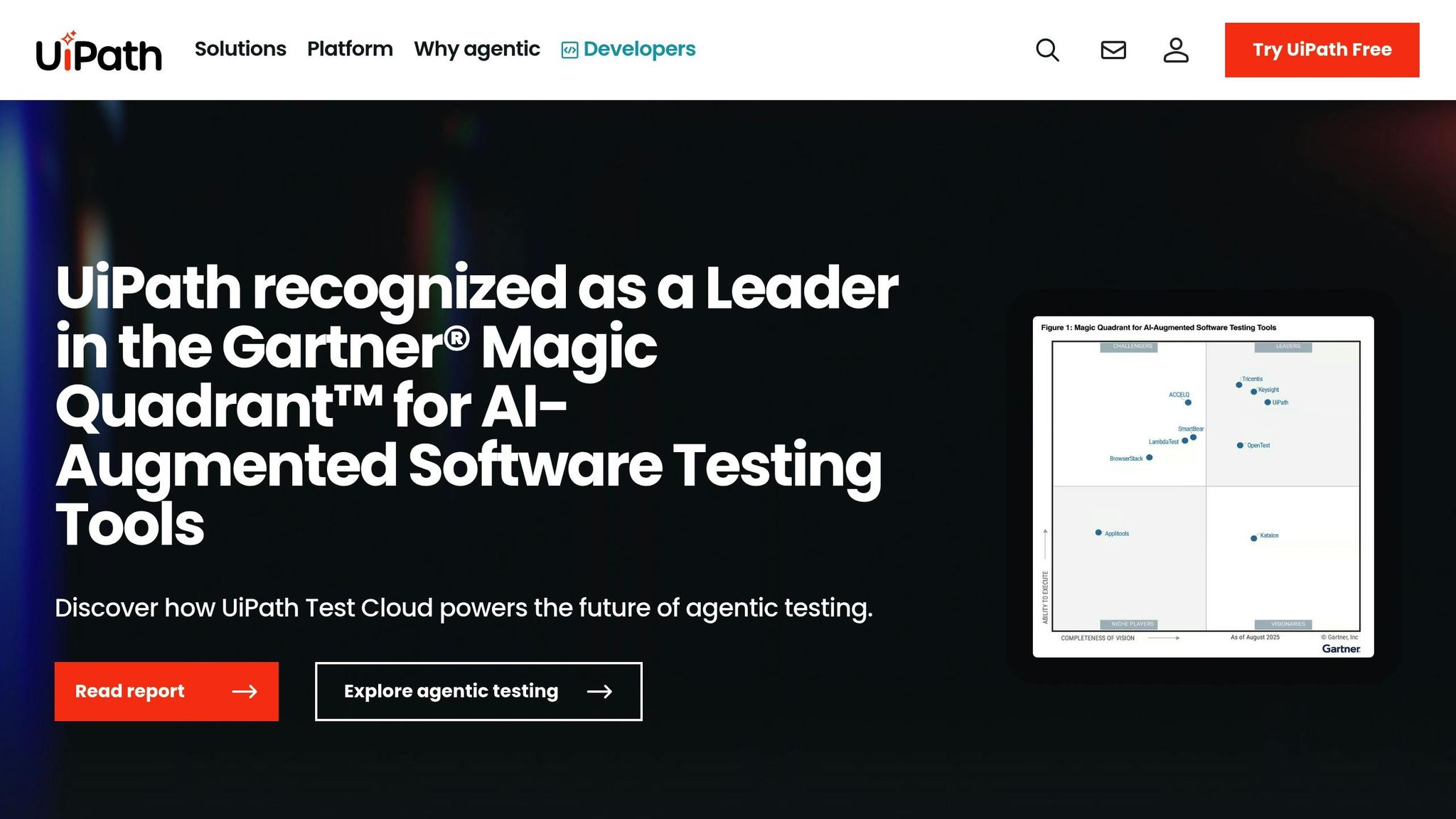
UiPath offers a robust automation platform that integrates AI operations seamlessly into existing workflows. By combining robotic process automation (RPA) with AI orchestration, it provides a versatile solution for businesses looking to enhance efficiency. Its focus on prompt routing, cost control, and compliance positions it as a valuable tool for enterprises navigating the complexities of AI integration.
UiPath helps businesses keep AI-related expenses under control through its AI Trust Layer, which includes built-in throttling to set usage limits. This feature minimizes the risk of unexpected cost overruns, ensuring operations stay within budget. Beyond cost management, UiPath simplifies the integration of AI into existing workflows, making it accessible and practical for organizations.
The platform stands out in its ability to embed AI-driven prompt routing directly into established business processes. Tools like UiPath Orchestrator and Maestro equip AI agents with lifecycle management, auditing, and governance features. This makes it easier for IT teams to incorporate AI capabilities without disrupting existing systems.
UiPath places a strong emphasis on governance and compliance, providing tools to manage and monitor AI operations effectively. Its Automation Ops platform serves as a centralized hub where administrators can define and enforce policies across various AI activities. These policies can be tailored to specific tenants, groups, or users, offering detailed control over AI agent behavior.
The AI Trust Layer enhances compliance with features such as per-group permissions, PII redaction, detailed audit logs, and usage controls. For organizations handling sensitive information, PII redaction ensures adherence to data privacy regulations. Additionally, UiPath employs a human-in-the-loop approach for high-risk decisions, enabling expert oversight and reducing potential errors. This combination of tools and practices ensures that businesses can confidently manage AI operations while maintaining strict regulatory standards.
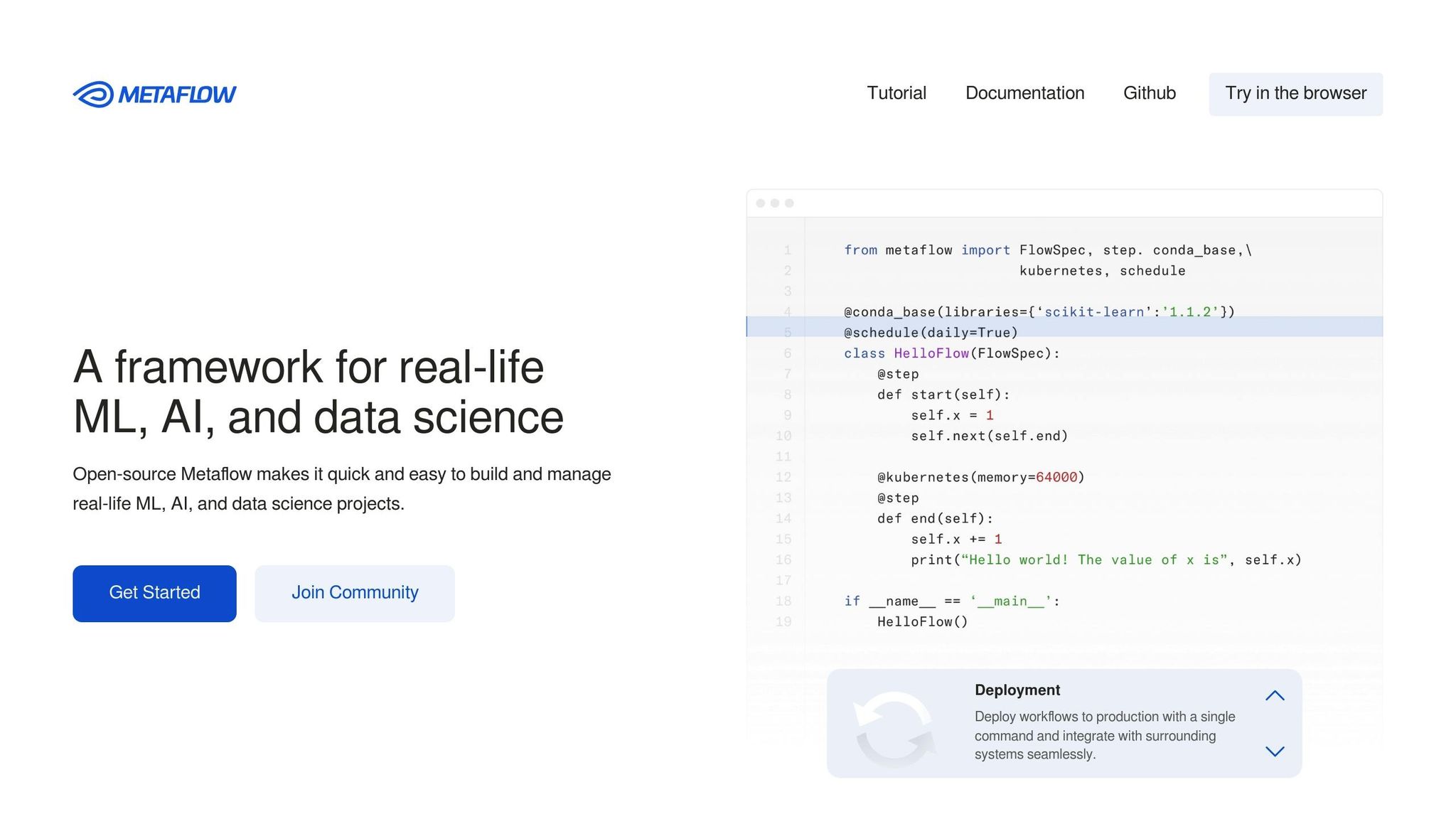
Metaflow offers a machine learning platform that combines advanced capabilities with straightforward, transparent pricing, ensuring users can manage their budgets with ease.
Metaflow’s pricing starts with a "Free Forever" plan, which includes 1,000 execution credits. For those needing more, the Solo Growth plan is available at $19 per month, while the Scale Pro plan costs $100 per month. Additionally, by integrating with AWS spot instances, users can reduce compute expenses by up to 70% compared to standard on-demand rates.
This clear and predictable pricing structure makes it easier for users to plan and control their operational costs effectively.
Metaflow’s pricing is presented in USD, catering specifically to the U.S. market. Both Metaflow.life and its managed service, Outerbounds, emphasize cost transparency and consistency. The tiered pricing system is designed to meet diverse needs, ranging from individual developers to large enterprise teams. For organizations with unique demands, custom enterprise solutions are also available.
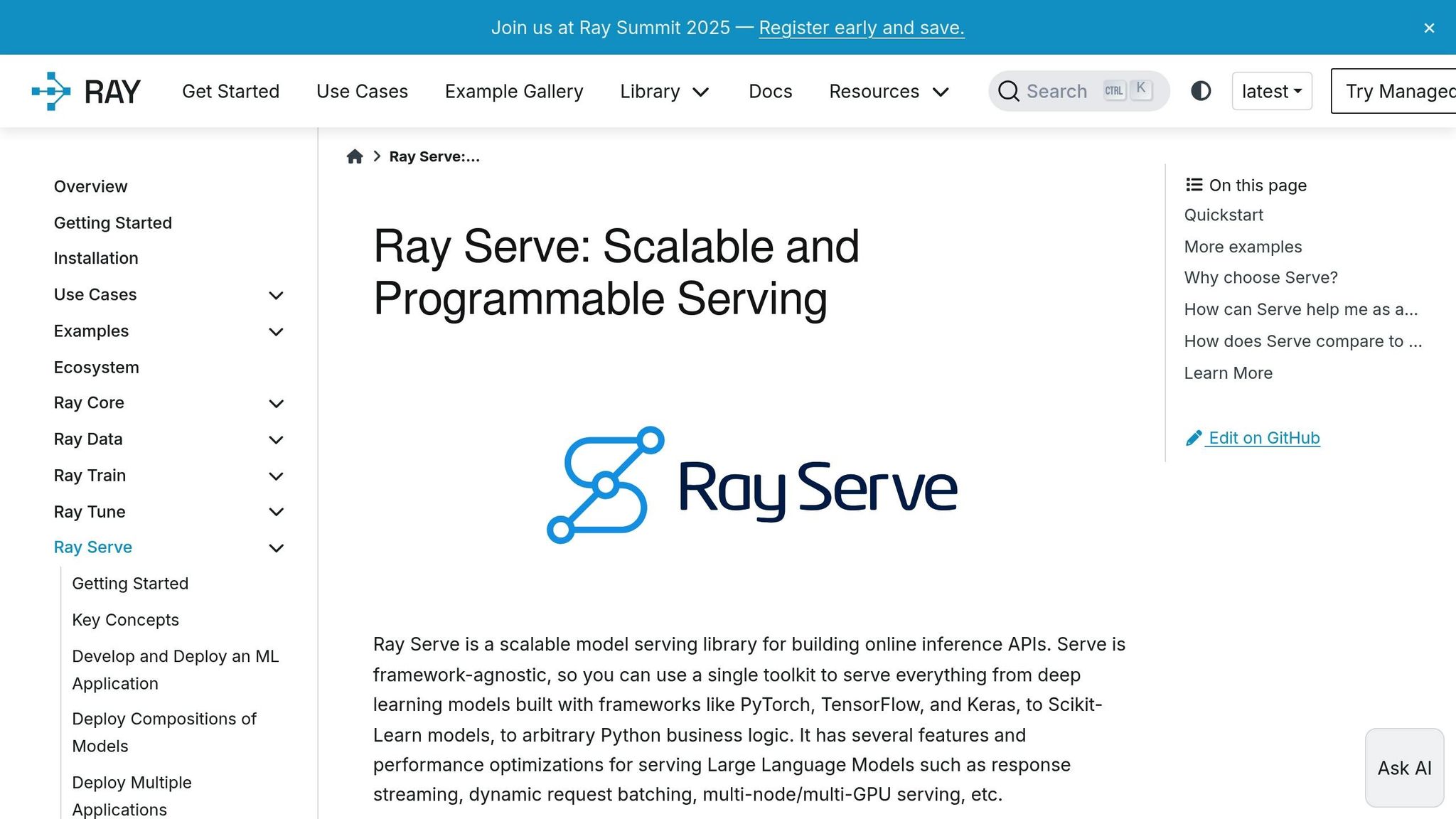
Ray Serve is an open-source library designed for scalable model serving, built on the powerful Ray framework. It provides a cost-effective solution with no licensing fees.
One of the standout benefits of Ray Serve is its ability to optimize costs through flexible resource allocation. It supports fractional GPU usage, allowing multiple machine learning models to share the same hardware. This means the main cost driver is the infrastructure itself. Ray Serve operates seamlessly across various environments, whether it’s a laptop, a Kubernetes cluster, major cloud platforms like AWS, Azure, and Google Cloud, or even on-premise systems. This adaptability lets organizations choose hosting options that balance cost and performance effectively, making it a practical choice for businesses.
Since Ray Serve doesn’t require licensing fees, the overall expenses depend solely on infrastructure and usage. For US-based companies, deploying Ray Serve on domestic cloud providers offers clear advantages. Transparent pricing in USD simplifies budget management and allows for more accurate cost forecasting, making it easier for businesses to plan and manage their AI-related spending.
Evaluating the strengths and weaknesses of different platforms is crucial for making informed decisions about cost-effective prompt routing. Here’s an overview of the unique trade-offs each platform offers.
prompts.ai simplifies cost management with its pay-as-you-go pricing model. By using the TOKN credit system, it eliminates the need for multiple tool subscriptions, ensuring businesses only pay for what they use, without recurring fees.
IBM watsonx Orchestrate stands out for its enterprise-grade reliability and seamless integration with IBM’s existing infrastructure. Companies already using IBM services can benefit from streamlined workflows and consolidated billing in USD. Its strong governance and compliance features make it ideal for enterprises, though its higher entry costs and potential vendor lock-in could limit flexibility.
UiPath specializes in automating workflows with a visual builder that’s easy for non-technical users to navigate. This accessibility can reduce training costs and integrates well with business systems. However, its licensing model can become expensive as usage scales, and its focus on automation may limit its broader applicability.
Metaflow caters to data science teams, offering flexibility for machine learning workflows. As an open-source platform, it avoids licensing fees and includes features like version control and experiment tracking. However, setting it up requires technical expertise, which could lead to higher operational costs if specialized personnel are needed.
Ray Serve provides a cost-effective option for organizations with robust technical capabilities. Its fractional GPU usage and flexible resource allocation help cut infrastructure costs, while supporting deployment across various environments. However, the lack of dedicated enterprise support and the need for in-house expertise could result in hidden costs related to time and resources.
The comparison table below outlines these key points for quick reference:
| Platform | Key Strengths | Main Drawbacks | Best For |
|---|---|---|---|
| prompts.ai | Cost savings up to 98%, unified interface, usage-based pricing | Limited to pay-as-you-go model | Organizations seeking streamlined cost management |
| IBM watsonx Orchestrate | Enterprise reliability, compliance features | Higher entry costs, potential vendor lock-in | Large enterprises using IBM infrastructure |
| UiPath | User-friendly automation, easy integration | Expensive at scale, narrow automation focus | Businesses focused on process automation |
| Metaflow | Open-source, no licensing fees | Requires technical expertise for setup | Data science teams with technical resources |
| Ray Serve | Low infrastructure costs, fractional GPU usage | No enterprise support, demands expertise | Organizations with strong technical teams |
The choice of platform depends heavily on the size and technical capacity of your organization. Smaller businesses may find prompts.ai’s transparent pricing and all-in-one approach appealing, while large enterprises might prioritize IBM watsonx Orchestrate for its robust support and compliance features, despite the higher costs. Open-source solutions like Metaflow and Ray Serve provide significant savings but require a team with technical expertise to fully leverage their capabilities.
Cloud-based platforms such as prompts.ai and IBM watsonx Orchestrate offer predictable pricing in USD, whereas open-source options demand a more detailed assessment of hosting and staffing expenses. Balancing these factors - technical requirements, cost, and ease of use - is essential for optimizing prompt routing to meet your business needs. Platforms like UiPath or prompts.ai can minimize training costs, while technically intensive solutions like Ray Serve and Metaflow may require a higher initial investment in team development.
After thoroughly analyzing platform options, one solution clearly stands out. Based on cost efficiency and functionality, prompts.ai proves to be the ideal choice for businesses in the US. Its pay-as-you-go TOKN credit system not only reduces expenses but also streamlines access to over 35 leading language models - all through a single, user-friendly interface.
For small and medium-sized businesses (SMBs) and startups, prompts.ai simplifies financial planning with transparent pricing in USD. Plans range from $0 per month for initial exploration to $29–$129 per member, making it easier to manage costs and avoid unnecessary operational hurdles.
While the best platform ultimately depends on factors like technical expertise, budget, and scalability needs, prompts.ai strikes the right balance for most US companies. With its affordability, robust performance, and ease of use, it stands as the recommended choice for optimizing AI workflows in 2025, aligning perfectly with the findings of our analysis.
The TOKN credit system offered by prompts.ai is built to help businesses cut down on AI expenses by charging only for actual usage. This pay-as-you-go approach removes extra costs, allowing companies to manage their budgets more effectively while keeping operations efficient.
With its real-time usage-based pricing, the TOKN system can slash costs by up to 98%, making it a smart choice for businesses looking to simplify their AI workflows without breaking the bank.
Prompts.ai takes the hassle out of daily operations by automating repetitive tasks, freeing up teams to concentrate on more impactful, strategic projects. With access to over 35 large language models in a single platform, teams can effortlessly compare results and choose the most suitable solutions, boosting overall efficiency.
The platform is designed for quick and easy onboarding, allowing teams to start using AI tools effectively from the very first day. This makes it a perfect choice for businesses aiming to streamline workflows and foster better collaboration across departments.
Prompts.ai takes data privacy and security seriously, aligning with stringent US regulations like GDPR, CCPA, and other applicable standards. The platform integrates strong safeguards, including advanced access controls, encryption, and monitoring tools, to protect sensitive information and promote ethical AI practices.
On top of that, Prompts.ai offers centralized management tools that empower businesses to oversee AI model access, monitor usage, and uphold compliance policies. This approach ensures workflows not only meet regulatory demands but also stay efficient and well-organized.


